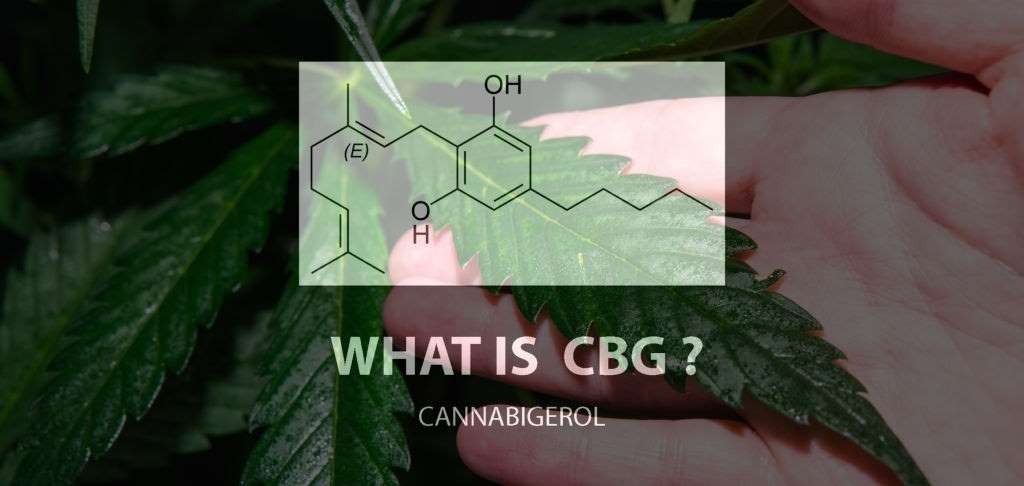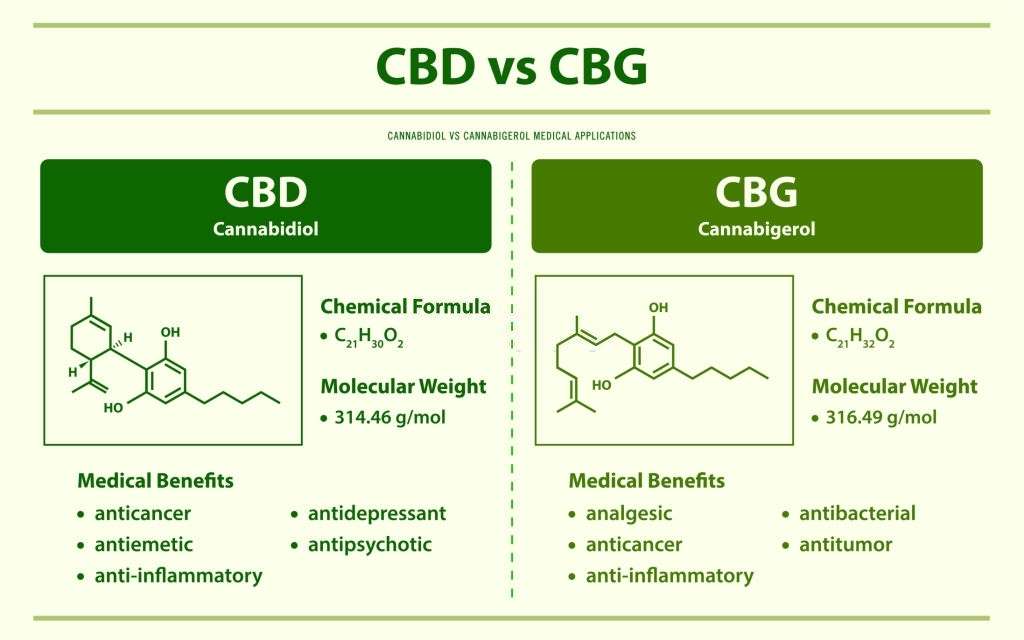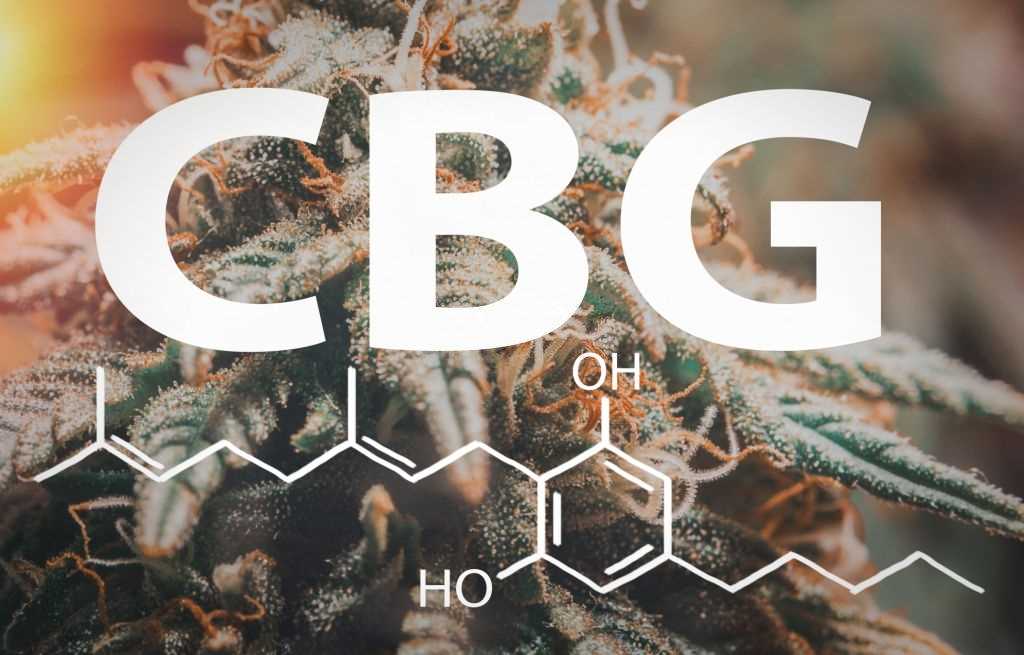You might have heard about the health benefits of cannabidiol and delta-9 THC – the well-accepted cannabinoids. Besides these popular cannabinoids, the cannabis plant contains more than a hundred cannabinoids. Cannabigerol – CBG is another cannabinoid that has seized the interest of consumers. Is it beneficial for human health? Does it share similarities with CBD? Keep reading; none of your questions will remain unanswered at the end of this post CBD VS CBG.
Some preclinical studies show that CBG is a non-intoxicant similar to CBD. When put together in tandem, these cannabinoids enhance the effectiveness of each other. You may wonder how CBG is unique to its cousin CBD. Or what is the difference between these two cannabinoids?
Let’s have a deeper dive into this!
What Is CBG?

SALE: Buy Premium CBD Gummies!
Each delicious gummy is infused with high-quality CBD to help alleviate pain, reduce stress, and enhance your mental well-being. Perfect for those seeking a natural way to unwind and support overall health.
Buy NowCBG is one of the 115 cannabinoids out there. Research studies are exploring the health benefits and therapeutic effects of cannabigerol. It can offer:
- Antibacterial
- Antidepressant
- Anti-cancer properties
It can manage physical discomfort without a psychoactive buzz of THC. CBG results from the conversion of CBGA – Cannabigerolic Acid. CBGA is the mother of all cannabinoids, such as it converts into CBDA, CBCA, and THCA. When CBGA decarboxylate, it becomes CBG that can interact with the endocannabinoid system.
Generally, it is a minor cannabinoid present in low concentrations in the cannabis plant. However, cultivars have grown CBG-rich strains for research purposes. Higher levels of CBG in the cannabis plant facilitate its extraction for therapeutic applications.
What Is CBD?
Cannabidiol, better known as CBD, is one of the active and well-researched cannabinoids of the cannabis plant. It is a non-intoxicant cannabinoid that does not cause euphoria and paranoia. It has become an appealing option for all users who want to avoid the head-high effects of THC.
Moreover, FDA has approved, Epidiolex, a combination of CBD & THC to treat seizures of epilepsy. Also, some people take it to reduce pain, inflammation, anxiety, stress, and other health conditions.
Cannabidiol interacts with the more complex signaling network of the human body. The ECS works with its cannabinoid receptors and endocannabinoids to impart particular effects.
Characteristic Difference Between CBD & CBG

SALE: Buy Premium CBD Gummies!
Each delicious gummy is infused with high-quality CBD to help alleviate pain, reduce stress, and enhance your mental well-being. Perfect for those seeking a natural way to unwind and support overall health.
Buy NowCBD and CBG are different from each other in the following aspects:
CBD VS CBG – Chemical Makeup:
CBG has 21 carbon atoms, 32 hydrogen atoms, and two oxygen atoms. The carbon, hydrogen, and oxygen atoms that constitute a cannabinoid have a different arrangements.
On the other hand, CBD has 21 carbon atoms, 30 hydrogen atoms, and two oxygen atoms. Also, they have different three-dimensional shapes than CBG. Collectively, both cannabinoids interact with the endocannabinoid system differently to produce unique therapeutic effects.
CBD VS CBG – Pharmacology:
A research study posted in the Journal of Psychopharmacology found the difference between the mechanism of CBD & CBG interaction with 5HT1A serotonin receptors. CBD binds with these receptors, while CBG blocks it. Hence, CBG inhibits the effects of cannabidiol due to its opposing actions of 5HT1A receptors.
CBD VS CBG – Effects on Appetite:
Another noticeable difference between these cannabinoids is their effects on appetite. A research study found that intake of CBG encourages animals to consume more food than normal. Contrary to this, CBD suppresses the appetite of the consumer.
Why Is CBG More Difficult to Produce than CBD?
You might be wondering why CBD has not experienced the same swell in popularity as CBD. One of the largest roadblocks in its popularity is its production cost. Typically, it exists in trace amounts in the cannabis plant. Its manufacturing has made it the most expensive cannabinoid in the market. Moreover, Some people in the industry call it Royal-Royce of cannabinoids. That is because it takes thousands of biomass to create a small amount of CBG isolates.
CBG is problematic when it comes to cultivation. The more time the cannabis plant spends in the soil, the more the conversion rate of CBGA into CBG. Generally, manufacturers have two options, either grow less cannabis with high CBD content or more cannabis with less CBG.
Additionally, manufacturers use Swiss Precision from the chromatography apparatus to extract the CBG isolates from other hemp extracts. Also, high-performance chromatography is more expensive than regular ones.
Does CBG Interact with Medications?
Right now, there is limited research about CBG-induced drug interaction. If you take any medications for a health condition, be sure to consult your healthcare professional before trying CBG products.
Here is the list of medications that may interact with cannabinoids:
- Antibiotics and antimicrobials
- Anticancer medications
- Blood pressure medications
- Antidepressants
- Heart rhythm medications
- Antiepileptic drugs
- Antihistamines
- Cholesterol medications
- Corticosteroids
- Erectile dysfunction medications
- Gastrointestinal medications
- Immunosuppressants
- Pain medications
- Prostate medications
Final Thoughts:
CBG continues to make big headlines in the cannabis market. Although the research around is still pretty limited, researchers are very optimistic about its potential health benefits.
Before CBG becomes more common and its prices drop down, it might be easier to find high-quality full-spectrum CBD extracts from hemp strains with a higher-than-average CBG content. Just make sure to read third-party lab reports, and if you take any medications or have an underlying condition, check in with your doctor first.

